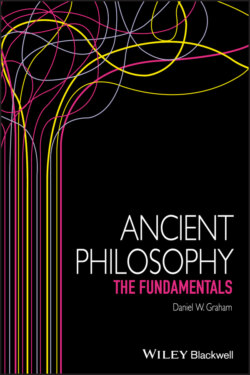Читать книгу Ancient Philosophy - Daniel W. Graham - Страница 8
1
Introduction
ОглавлениеIn the 460s BC a young Greek tourist made a journey up the Nile river in Egypt in search of answers. Among other things, he wanted to know what made the Nile flood, for it flooded at an odd time: in mid‐summer, not in winter or spring when the rivers in Greece flood with seasonal rains and melting snow. When he asked the local priests, they could tell him nothing, he reports. Perhaps they informed him that the Nile god caused the floods. But that was no answer. He went on to evaluate three different philosophical theories: the floods were caused by the summer winds that blew from the north and pushed back the Nile waters as they flowed northward, heaping them up; or they were caused by water flowing into the Nile from Ocean, a mythical watercourse flowing around the rim of the flat disk‐shaped Earth; or they were caused by melting snows in high mountains to the south. The young man rejected all these theories for their manifest failures to get the facts right, and he proposed a complicated theory of his own. At roughly the same time, a Greek sailor from Massalia went on a voyage that took him through the Pillars of Hercules to the west coast of Africa. He saw there a river with flora and fauna like that of the Nile and noted heavy winds blowing offshore, which he thought supported the second theory of the Nile floods.
The tourist, named Herodotus, went on to win undying fame as the Father of History.1 The sailor, Euthymenes, wrote an engaging memoir of his travels.2 Something strange was happening in the world. A tourist from Ionia (the Aegean coast of modern Turkey) and a sailor from Marseilles (Massalia was the Greek colony that preceded the French city) were traveling the world looking for evidence – scientific evidence, we could say – for theories about natural phenomena that everyone, including the Greeks, used to attribute to the workings of the gods. The idea of a rational explanation of the world based on natural processes rather than supernatural interventions was beginning to catch on. The proponents of the new approach we now call philosophers. Without them, the world we live in today would be immeasurably poorer.
